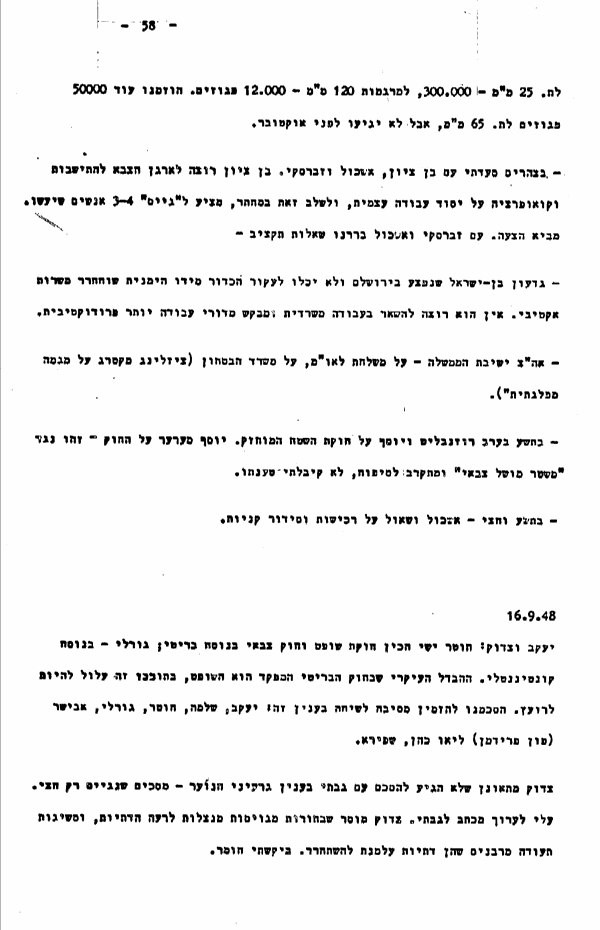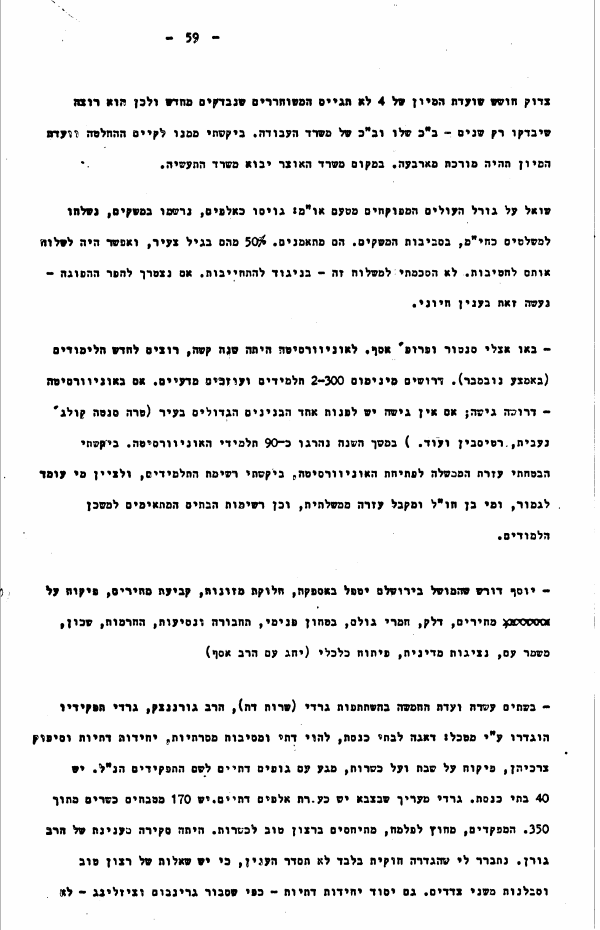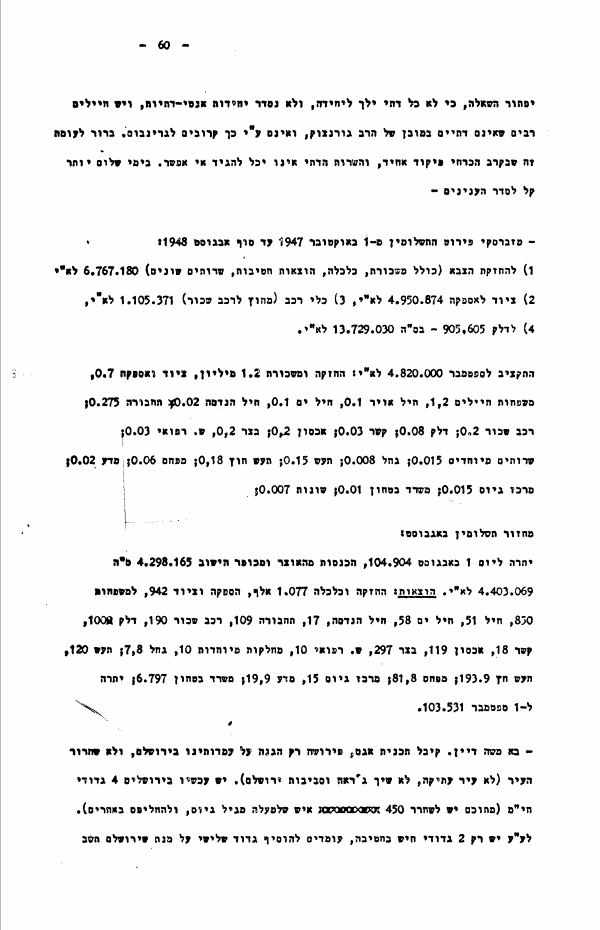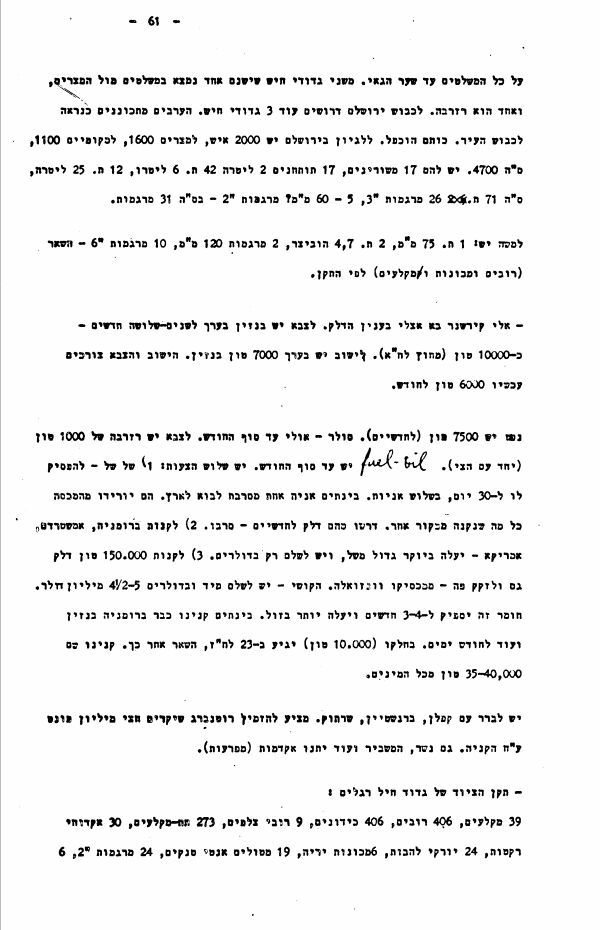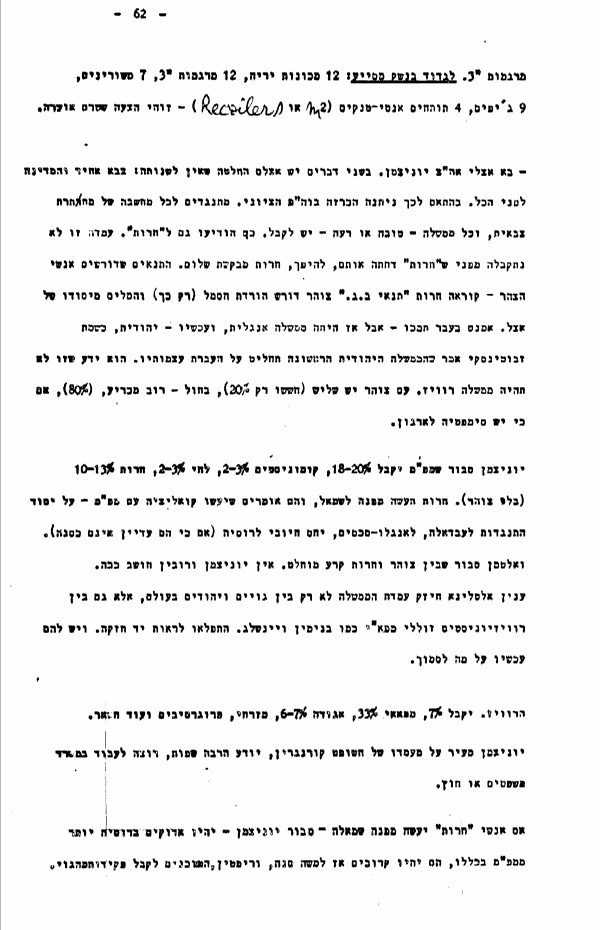1
of
Places:
United States
Goren
Egypt
Romania
Mexico
Nesher
Shamir
Jerusalem
Amsterdam
The use of the photograph is subject to the Copyright Law, 2007
15.09.1948
224856
[Thursday,] September 16, 1948 Ya’akov [Dori] and [Moshe] Zadok: [Aharon] Hoter-Yishai drafted a judiciary law, and a military law in the British format; [Avraham] Gorali – in the continental format. The main difference is that in the British law, the commander is a judge. For us that could be a hindrance. We agreed to call a meeting to discuss this matter: Ya’akov [Dori], Shlomo [Shamir], Hoter[-Yishai], Gorali, Avissar [Eitan von Friedman], Leo Kohn, [Ya’akov Shimshon] Shapira. [Moshe] Zadok is complaining that he couldn’t reach an agreement with [Haim] Gvati regarding the youth [immigration programs] settlement groups – [Gvati] agrees only to our conscripting half of them. I need to draft a letter to Gvati. Zadok reports that conscripted women are exploiting religiousness [religious identification] and obtaining certificates from a rabbi stating that they’re religious in order to be released. I requested material. Zadok is concerned that the classification committee of 4 [the “combing” committee for screening draftees, discussed on August 20 and August 26, 1948] won’t conscript those released who are being re-examined, so he wants to have only two people do the examining – his own representative and a representative from the Ministry of Labor. I asked him to abide by the decision, the classification committee will be composed of four. Instead of the Finance [Ministry], it will be the Ministry of Industry participating. He asks about the fate of the [draft-age] immigrants who are subject to UN oversight: about 2,000 were conscripted, registered for settlements, sent to strongholds as garrison, near the settlements. They’re in training. 50% of them are young, and could have been assigned to brigades. I didn’t agree such assignment in breach of [our] commitment. If we have to violate the truce – let it be for something vital. – [Werner] Senator and [Rabbi] Prof. [Simcha] Assaf came to see me. The university’s had a difficult year, they want to resume studies (in mid-November). They require a minimum of 200-300 students and scientific assistants. Holding classes at the university [on Mount Scopus] requires access; if there’s no access, then one of the large buildings in the city should be made available (Terra Sancta, the girls’ college, Ratisbonne, etc.). Over the past year about 90 university students have been killed. I promised government support in opening the university, [and] I requested a list of students, an indication of who’s about to finish, and who’s from abroad and receiving government assistance, as well as lists of suitable buildings to accommodate the studies. – [Dov] Yosef requests that the governor in Jerusalem handle supplies, food distribution, price setting, oversight over prices, fuel, raw materials, internal security, transport and travel, confiscations, housing, the People’s Guard, political representation, economic development. – At twelve the committee of five (along with Rabbi Assaf) with the participation of [Natan] Gardi (religious service), Rabbi Goronczik [Shlomo Goren, the chief army rabbi]. Gardi’s duties were defined by the chief of staff: responsibility for synagogues, for a religious atmosphere and traditional celebrations, religious units and provision of their needs, supervision over Shabbat and kashrut, contact with religious bodies for the sake of [fulfilling] the above duties. There are 40 synagogues. Gardi estimates that the army has about 10,000 religious personnel. There are 170 kosher kitchens out of 350. The commanders, aside from Palmach, approach kashrut with goodwill. There was an interesting survey by Rabbi Goren. It became clear to me that a legal determination by itself won’t settle the issue, because there are questions of goodwill and patience on both sides. Nor will the formation of religious units – as [Yitzhak] Gruenbaum and [Aharon] Zisling believe – resolve the question, because not every religious person will go to [such a] unit, and we won’t set up anti-religious units, and there are many soldiers who are not religious in the sense Rabbi Goronczik means, nor as a consequence close to Gruenbaum. In contrast it’s clear that during battle a unified command is imperative, and the religious service cannot say that it’s not possible. In times of peace it’s easier to sort out these matters. – Zabrasky [submitted] a statement of expenditures from October 1, 1947, through the end of August 1948: 1) Upkeep of the army [personnel] (including salary, subsistence, brigade expenses, various services) P£ 6,767,180, 2) Equipment for supplies P£ 4,950,874, 3) Vehicles (aside from rented vehicles) P£ 1,105,371, 4) For fuel 905,605 – in total, P£ 13,729,030. The budget for September is P£ 4,820,000: upkeep and salaries 1.2 million, equipment and supplies 0.7, soldiers’ families 1.2, air force 0.1, navy 0.1, engineering corps 0.02, transport 0.275; rented vehicles 0.2; fuel 0.08; signal 0.03; housing 0.2; fortification 0.2; medical s. [service] 0.03; special services 0.015; GAHAL [overseas recruitment] 0.008; Ta’as [home manufacture of weapons] 0.15; Ta’as abroad [foreign weapons manufacturing] 0.18; chemicals factories 0.06; science 0.02; recruitment center 0.015; Defense Ministry 0.01; miscellaneous 0.007. Income and expenses for August: Balance as of 1 August 104,904, income from Finance [Ministry] and Kofer HaYishuv [the Yishuv’s defense fund] 4,298,165[;] total P£ 4,403,069. Expenditures: upkeep and subsistence 1.077 thousand, supplies and equipment 942, [support] for families 850, [air?] force 51, navy 58, engineering corps 17, transport 109, rented vehicles 190, fuel 100, signal 18, housing 119, fortification 297, medical s. 10, special platoons 10, GAHAL 7.8; Ta’as 120, Ta’as abroad 193.9; chemicals factories 81.8; recruitment center 15, science 19.9, Defense Ministry 6.797, balance as of 1 September 103,531. – Moshe Dayan came [from Jerusalem]. He’d received the Operations Department plan. It addresses only the defense of our positions in Jerusalem, not the liberation of the city (not the Old City, not Sheikh Jarrah or Jerusalem’s surroundings). Right now there are 4 garrison battalions in Jerusalem (from which 450 men over draft age have to be released and replaced with others). At the moment there are only 2 Hayish [Haganah Field Corps] battalions in the brigade; they’re going to add a third battalion so that the Jerusalem [Brigade] is positioned in all the strongholds up to Sha’ar HaGai. Of the two Hayish battalions that are there, one is in the strongholds facing the Egyptians, and the other is a reserve. The conquest of Jerusalem requires another 3 Hayish battalions. The Arabs are apparently planning to conquer the city. Their strength has been doubled. The Legion in Jerusalem has 2,000 men, the Egyptians [south of the city] 1,600, the locals 1,100, in total 4,700. They have 17 armored vehicles, 17 2-pound cannons [on armored vehicles], 42 [anti-tank] 6-pound C. [cannons], 12 25-pound [field] C. – total 71 C., 26 3” mortars, 5 – 60 mm? [French mortars], 2” mortars – in total 31 mortars. Moshe [Dayan] has: 1 75 mm C., 2 3.7” Howitzer C., 2 120 mm mortars, 10 6” mortars – the rest (rifles, [heavy] machine [gun]s, and [light] machine guns) per the standard [the guidelines]. – Eli Kirshner came to see me regarding fuel. The army has enough gasoline for about two-three months – about 10,000 tons (outside of the air force). The Yishuv has about 7,000 tons of gasoline. Currently the Yishuv and the army consume about 6,000 tons per month. There are 7,500 tons of crude oil (for two months). Diesel – maybe until the end of the month. The army has a reserve of 1,000 tons (along with the fleet). There’s fuel oil until the end of the month. There are three proposals: 1) By Shell – to provide him with enough for 30 days, via three ships. At this time one ship refuses to come to the country. They’ll subtract any amount bought from another source from the quota. They asked them for fuel for two months – they refused. 2) To buy it in Romania, Amsterdam, America – will cost much more than from Shell, and can only be paid in dollars. 3) To buy 150,000 tons of crude fuel [petroleum?] from Mexico and Venezuela and refine it here. The problem – need to pay immediately and in dollars $ 4½-5 million. This material will last 3-4 months and the cost will be cheaper. In the meantime we’ve already bought gasoline and more in Romania for a month. Part of it (10,000 tons) will arrive on September 23, the rest later. We bought 35,000-40,000 tons of all the types there. Need to consult with [Eliezer] Kaplan, [Peretz] Bernstein, [Moshe] Shertok. [I] suggest inviting [Avraham] Rutenberg [of the electric company – a major consumer of crude oil] to advance half a million pounds as against the purchase. Nesher [cement company] and HaMashbir and others will also provide advance payments. – The equipment standard for an infantry battalion: 39 [light] machine guns, 406 rifles, 406 bayonets, 9 sniper rifles, 273 submachine guns, 30 rocket launchers, 24 flamethrowers, 6 [heavy] machine guns, 19 anti-tank rocket launchers, 24 2” mortars, 6 3” mortars. Auxiliary weapons per battalion: 12 [heavy] machine guns, 12 3” mortars, 7 armored vehicles, 9 jeeps, 4 anti-tank cannons (M2 or Recoilers) – this proposal has not been approved yet. – In the afternoon [Dr. Shimshon] Unichman came to see me. There are two matters on which they [the Revisionists] have made a decision that cannot be changed: a unified army, and the state above all else. Accordingly, an announcement was made in the Zionist General Council. They oppose any thought of a military underground, and any government – good or bad – must be accepted. This is also what they told Herut [Founded by ETZEL]. This position wasn’t accepted because Herut rejected it; on the contrary, Herut seeks peace. [Regarding] the terms demanded by HATZOHAR [the Revisionist Zionist Party] members – Herut calls [them] “B.G. terms.” TZOHAR demands that the symbol (“Rak Kach” [“only thus”]) and the words “Founded by ETZEL” be removed [from the movement’s banner]. Although in the past [TZOHAR members] supported [ETZEL] – at that time the government was English, and now it’s Jewish. When Jabotinsky died, he said that the first Jewish government would decide on the transfer of his bones. He knew that it would not be a Revisionist government. With TZOHAR there’s one-third (they feared it would only be 20%), abroad – a decisive majority (80%), although there is sympathy for the Irgun [ETZEL]. Unichman is certain that [in the elections] Mapam will receive 18-20%, the Communists 2-3%, LEHI 2-3%, Herut 10-13% (without TZOHAR). Herut will shift to the left, and they say they’ll form a coalition with Mapam based on opposition to Abdallah [and] the Anglo-Saxons [the British] [and] a positive attitude to Russia (although they still aren’t in line with [Moshe] Sneh). [Dr. Aryeh] Altman believes there’s a complete rupture between TZOHAR and Herut. Unichman and [Ya’akov] Rubin do not think so. The Altalena strengthened the government’s position not only among Gentiles and Jews around the world, but also among Revisionists who disparage [?] Mapai such as [the attorney Yitzhak] Binyamini and [Dr. Yaakov] Weinshall. They were surprised to see a firm hand, and now they have something to rely on. The Revisionists will receive 7%, Mapai 33%, Aguda [Agudas Israel] 6-7%, Mizrachi, Progressives and others – the rest. Unichman brings up the position of Judge [Philip] Korngreen. Speaks many languages, wants to work in the Ministry of Justice or [Foreign] Ministry. If Herut members shift to the left – Unichman thinks – they’ll be more devoted than Russia than Mapam as a whole. Then they’ll be close to Moshe Sneh and [Ya’akov] Riptin, who are willing to take orders from the Gentile.





